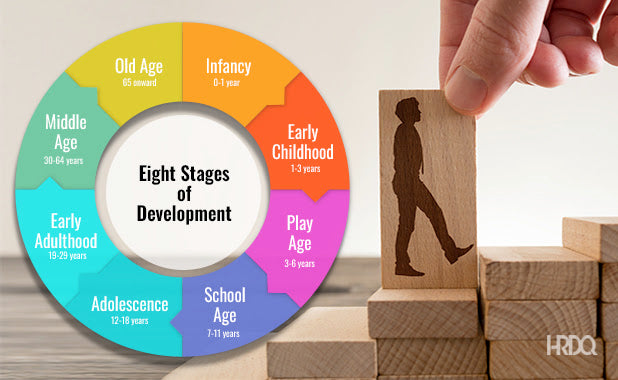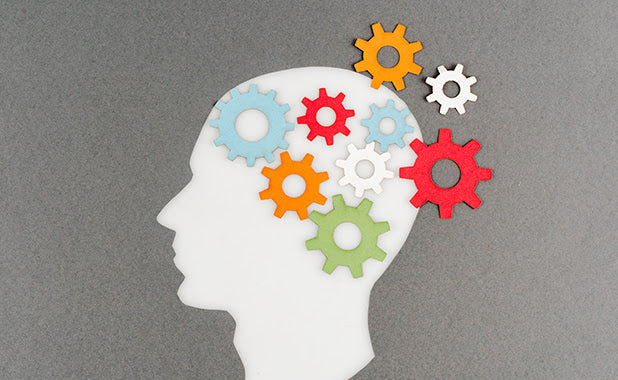Share
[Guide] Mapping the Path of Erikson's Developmental Process
Bradford R. GlaserImagine a map that spreads from when you're born until you're gray and old. It's a map that shows the complicated process of being human.
Sounds complex, right? But, it's in Erikson's psychosocial development concept. We're trying to figure out the crazy twists and turns our lives take.
We will pick apart Erikson's ideas and dig into what it means for humans to grow and learn. Let's dig into this interesting theory a bit.

- Enhance Team Dynamics
- Identify Your Style in 10 Mins
- Interactive & Engaging Tools
Table of Contents
What Are the Eight Stages of Development?
Erikson's theory is a great way for you to know how humans develop from when we're small to when we're old – and it's in the significant hurdles we have to jump over in every stage to shape who we become.

The first stage hits in the first year of life. Trust becomes our foundation when we get the basic things we need, like food, safety, and love.
Then, from one to three years old, we learn about the sweet spot between being independent and knowing when to reel it in. If we get it right, we feel confident; if not, we might feel somewhat insecure and embarrassed.
When we reach the ages of three to five, we learn how to take the reins and make our own decisions. If things go right, we feel like we can take the initiative – but if they don't, we might feel inadequate and avoid taking charge.
Ages five to twelve is where we pick up all these important skills. If we nail it, we feel talented, but if we stumble, we might feel less than others.
From twelve to eighteen years, we start figuring out who we are by looking at different roles and beliefs. If it goes smoothly, we find our true selves, but if not, we might get confused about who we are.
Then there's the stage from eighteen to forty. It's in building solid and meaningful relationships. Make it work, and you find lasting love and friendship; mess it up, and loneliness becomes a familiar guest. In my view, you could face some pretty tough challenges at this stage.
Forty to sixty-five years? We start thinking about giving back to society and guiding the next generation. If we succeed, we feel a great sense of giving.
And once we hit over sixty-five, we start looking back at our lives and tying up loose ends. Doing it well, we gain wisdom and feel honest with ourselves, but a bad trip could lead us to regret or sadness.
Got it? Erikson's theory connects our growth, how we develop, and how we go through life's milestone moments. I believe it shows how our experiences shape us in every stage of our lives.
What Were Erikson's Beliefs?
Erikson's theory of development basically says that how you grow as a person happens in specific, separate stages. There's an important psychological turning point at each stage that shapes how you turn out.
Do people think that conflict is always a bad thing? Well, according to Erikson, it's something that helps you grow and mature. His way of looking at it wipes away all the negative things usually connected with conflict. He's like: conflict gets you moving from one stage to the next.
Erikson also talks a lot about how knowing what we can do guides how we act. Think about it – once you have the hang of controlling your body, you start to feel more confident, independent, and in charge. The boost in confidence from mastering this and other life skills? It's legit.

Another piece of Erikson's theory is self-identity. He believes that if you have a solid sense of who you are, you'll be able to have deeper, stronger relationships. As a result, people get attracted to you because you know yourself well, and that's closely linked to your ability to make tight bonds with others.
So, Erikson's got this big focus on ego identity – how you see yourself. He says that our experiences keep shaping this identity. That lets us change our view of ourselves as we move through life's different stages.
What's the main takeaway from Erikson's theory? He stresses the importance of each stage in our psychological development. Erikson especially focused on our ego identity – how we see ourselves. He incorporated this idea into every stage of life, which makes it a significant part of his theory.
The Benefits and Uses of the Theory
Erikson's theory of psychoanalysis can be a helpful guide for cutting through the stages of human development. It breaks down into eight specific stages, from infancy to adulthood – each stage presents its trademark troubles. You ace these challenges, and boom, you're nurturing essential skills and shaping a well-rounded personality.
Take a look at the fourth stage – a catchy little phrase called "Industry vs. Inferiority." Picture a kid struggling with feeling less than others. What happens? They might give school activities the cold shoulder – not the best for their growth. Here's where Erikson's concepts help! Teachers can use them to create a space that shouts, 'You're competent.' It's a beautiful way to lift a child's confidence.

Funnily enough, Erikson's theory isn't only applied to children; it's also quite the star in therapy. Think about the "Identity vs. Part Confusion" stage. It's downright awful, right? Teenagers stuck in this mess might find themselves down in the dumps. But our friend Erikson has got their back. Therapists can take his principles and smooth the road for teens navigating this rocky stage. That helps teens figure out who they are, and they'll be better off mentally and emotionally.
Does Erikson stop there? No way! His method is perfect for boosting self-awareness and individual growth. Think about the blend of situations we face in life like a young adult wanting to connect on a deeper level during the "Intimacy vs. Isolation" stage or an older person sizing up their life's accomplishments in the "Integrity vs. Despair" stage. If you get to these stages, you're better equipped to call the shots in conduct and relationships – finding fulfillment is what we're all after, right?
Erikson's theory really steps up to the plate when it comes to kids and teenagers. Parents and educators – you guys can spot a kid or teen's psychosocial crisis, thanks to Erikson. His theory lays the groundwork for personalized interventions. It works like a beauty!
Erikson's developmental theory is incredibly valuable in many mental health recovery plans. A fantastic example is the "Autonomy vs. Shame and Doubt" stage. Picture a person wrestling with independence, trying to build self-confidence and personal authority. In the grips of Erikson's theory, therapists can hand out exact strategies for beating this challenge, helping people zoom into the next developmental stage more efficiently.
The bottom line is that Erikson's theory is one heck of a tool! It creates sound mental health, boosts growth in children and teenagers, and encourages self-understanding. It can't get much better than that!
What Are the Criticisms of Erikson's Theory?
People have a lot of issues with Erikson's Developmental Process. Mainly, they say it's too vague. The problem with that? It makes it hard to test out meaningfully, and it might miss some essential details.
There's also a fight about whether Erikson's model considers things like race, ethnicity, and gender. You have to wonder if Erikson's own life shaded over the unique struggles people from different places or backgrounds face.
Another thing people point out is that the model doesn't give a nod to the fact that everyone's different. They argue that it doesn't consider a person's unique experiences and environment when it paints a picture of how we move through life stages. Does everyone follow these stages in perfect order? Think about it – life's somewhat random, right? So that might just completely upset this order.

The third issue is that some people bash Erikson's model for trying to fit everyone into the same mold regarding life's many challenges. Also, the idea that messing up at one stage stops you from moving forward in the next could undervalue our ability to change and learn from our mess-ups.
Erikson's model was a hit at first, but as time passed, people realized it might be a bit too simple when you're talking about the complex ways humans develop. You need to consider these criticisms if you're going to use the model. Any theory we recommend needs to be up for the unexpected, uneven paths that life takes us on.
The criticisms we've talked about don't mean we should totally throw Erikson's model away. But it's important to remember its limits. My tip? Knowing these limits will help you use the theory in a more helpful way as you deal with the hard things in human life.
Alternatives to Erikson's Theory
Erikson's Developmental Theory sparks fascinating discussions about other takes on developmental psychology, like Piaget's Theory of Cognitive Development. Piaget's technique moves away from Erikson's progressive stages, where the goal is to resolve deep-seated issues. Instead, Piaget suggested, "What if the usefulness of changing thought processes is important for kids to learn and shape their beliefs?" This idea gives a ton of credit to the part of the environment for growing children, contrasting with Erikson's more inward-looking view.
Taking a different path, there's Vygotsky's Sociocultural Theory. Isn't it interesting how Vygotsky saw cognitive development as mainly directed by social influences? Ditching Erikson's focus on the individual, Vygotsky argued that development is tied up with society and culture. Maybe a move like this – from internal to social ways of thinking – could change how we view development.

Let's switch gears and look at Maslow's Hierarchy of Needs. Picture a pyramid, with basic bodily needs at the bottom, working up to self-understanding at the top. Although it lines up motivations neatly, it doesn't square well with Erikson's theory that's in tackling stages of psychological need over getting what you want right now.
So, putting Piaget, Vygotsky, and Maslow side-by-side adds a fresh technique to developmental psychology, offering an alternative to Erikson's simple story. Their theories push the spotlight on real-world influences, the importance of socializing, and the need to fulfill primitive needs. You should know these theories suggest that growing isn't always a simple, age-limited process. When you fold these ideas into Erikson's theory, I believe it gives you a well-rounded take on developmental psychology. So, think of it as a mix of society and basic needs, all coming together within Erikson's ideas about tackling life crises.
How Can You Use Erikson's Theory?
Erikson's eight-stage model is really important in the field of psychology. Why? Because it's in understanding the practical side of our mind's growth. The cool thing about this model is that it helps to spot both the good things and possible hurdles at each point in development. It's like having a roadmap for your mind, which also gives deeper self-awareness and insight into other people. It can even help to sort out conflicts by pinpointing where you are in terms of Erikson's stages!
But hold on. If we want to grasp the complex nature of people and behavior, we need to blend a few theories. We're talking about the big guns here – Freud, Piaget, Maslow – all working together to give you a more comprehensive view of human behavior and individual growth.

Next up is this super helpful tool called What's My Style by HRDQ. It's a neat shortcut to get a clear view of your behaviors with an easy 18-item checklist. It helps you determine your personal leaning toward four main styles – Spirited, Direct, Considerate, and Organized – shaping your interactions with others.
This tool proves its worth everywhere – it boosts communication, nurtures leadership skills, and smoothens team building. It's super flexible and fits into pretty much any work environment. Also, you can get your hands on it in either print or digitally.
The important word here is practicality; plain theory won't make you grow. What's My Style, paired with Erikson's stages, can make for some active growth. Let's be honest: you want to be in the driver's seat of your change, not a passive viewer.
Let's not over-complicate things; knowing and understanding are the first steps towards change. If you have Erikson's model and HRDQ's tool at your disposal, you're well-equipped to steer your growth and motivate others to do the same. In my opinion, it's a real game-changer for personal development.


![[Guide] Mapping the Path of Erikson's Developmental Process](http://hrdqstore.com/cdn/shop/articles/Eriksons_Developmental_Process_520x500_9915a36f-58b9-4f82-aa72-8ab099a7d229.jpg?v=1741640982&width=1100)


















































